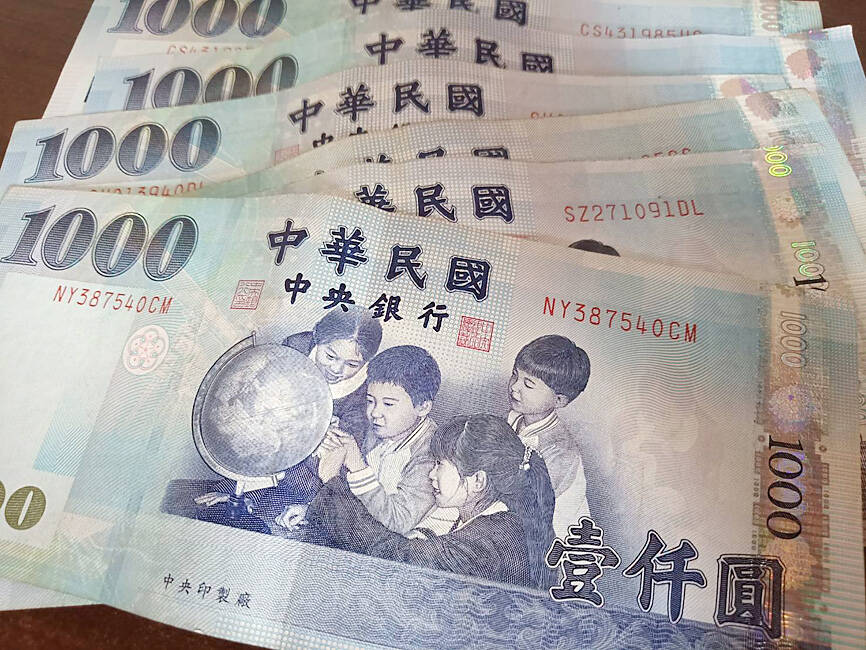The number of incidents of major tax evasion last year dropped to 915, while unpaid taxes eased to NT$89.51 billion (US$2.75 billion), as some evaders chose to cooperate while the tax recovery period expired for others, the Ministry of Finance said yesterday.
The ministry has since July 1, 2010, published a list of top tax evaders annually in hopes of pressuring them to pay their dues.
Major tax evaders are people and companies that owe the government more than NT$10 million and NT$50 million respectively in back taxes.

Photo: Tsai Ching-hua, Taipei Times
The list this year is similar to previous years, with late business tycoon and socialite Huang Jen-chung (黃任中) topping the list, owing NT$1.94 billion in estate tax. His older sister, Huang Hsin-ping (黃新平), ranked third, with NT$1.26 billion in back taxes.
His son, Huang Juo-ku (黃若谷), who had NT$1.9 billion in back taxes, was removed from the list after the recovery period expired in 2022, the ministry said.
There is little the ministry can do about the Huang family, as they do not own properties in Taiwan that the government can take, the ministry has said, adding that they would seek assistance at home and abroad once it finds traces of taxable assets.
The Kaohsiung-based family of real-estate businessman Huang Cheng-chih (黃承志) remained second, with NT$1.51 billion in unpaid income and estate taxes. He was the former head of Fu Yow Enterprise Co (婦幼實業) and was charged with fraud in 2001. Huang Cheng-chih has since fled to China.
Hsu-Cheng Wen-wen (許鄭溫溫) is new to the list, with back taxes of NT$521 million. She was the wife of Cosmos Bank (萬泰銀行) founder and chairman Hsu Sheng-fa (許勝發), who passed away in 2019. The court last year handed down a ruling on Hsu-Cheng’s case and confirmed she was the inheritor of her husband’s estate.
As for corporate tax evaders, Holiday Inn Asiaworld Taipei (環亞飯店), which changed ownership and became Illume Taipei (茹曦酒店), topped the list with NT$2.18 billion in back taxes, ministry data showed.
Asiaworld Taipei was followed by two Taichung-based nightclubs owing NT$1.16 billion and NT$1.09 billion in back taxes each.
The maximum tax recovery period is 15 years, following legal revisions in 2007, Huang Jen-chung’s case would stay valid until 2032, as the revision does not apply to old cases.

South Korea’s equity benchmark yesterday crossed a new milestone just a month after surpassing the once-unthinkable 5,000 mark as surging global memory demand powers the country’s biggest chipmakers. The KOSPI advanced as much as 2.6 percent to a record 6,123, with Samsung Electronics Co and SK Hynix Inc each gaining more than 2 percent. With the benchmark now up 45 percent this year, South Korea’s stock market capitalization has also moved past France’s, following last month’s overtaking of Germany’s. Long overlooked by foreign funds, despite being undervalued, South Korean stocks have now emerged as clear winners in the global market. The so-called “artificial intelligence

‘SEISMIC SHIFT’: The researcher forecast there would be about 1.1 billion mobile shipments this year, down from 1.26 billion the prior year and erasing years of gains The global smartphone market is expected to contract 12.9 percent this year due to the unprecedented memorychip shortage, marking “a crisis like no other,” researcher International Data Corp (IDC) said. The new forecast, a dramatic revision down from earlier estimates, gives the latest accounting of the ongoing memory crunch that is affecting every corner of the electronics industry. The demand for advanced memory to power artificial intelligence (AI) tasks has drained global supply until well into next year and jeopardizes the business model of many smartphone makers. IDC forecast about 1.1 billion mobile shipments this year, down from 1.26 billion the prior

People stand in a Pokemon store in Tokyo on Thursday. One of the world highest-grossing franchises is celebrated its 30th anniversary yesterday.

Chinese artificial intelligence (AI) start-up DeepSeek’s (深度求索) latest AI model, set to be released as soon as next week, was trained on Nvidia Corp’s most advanced AI chip, the Blackwell, a senior official of US President Donald Trump’s administration said on Monday, in what could represent a violation of US export controls. The US believes DeepSeek will remove the technical indicators that might reveal its use of American AI chips, the official said, adding that the Blackwells are likely clustered at its data center in Inner Mongolia, an autonomous region of China. The person declined to say how the US government received